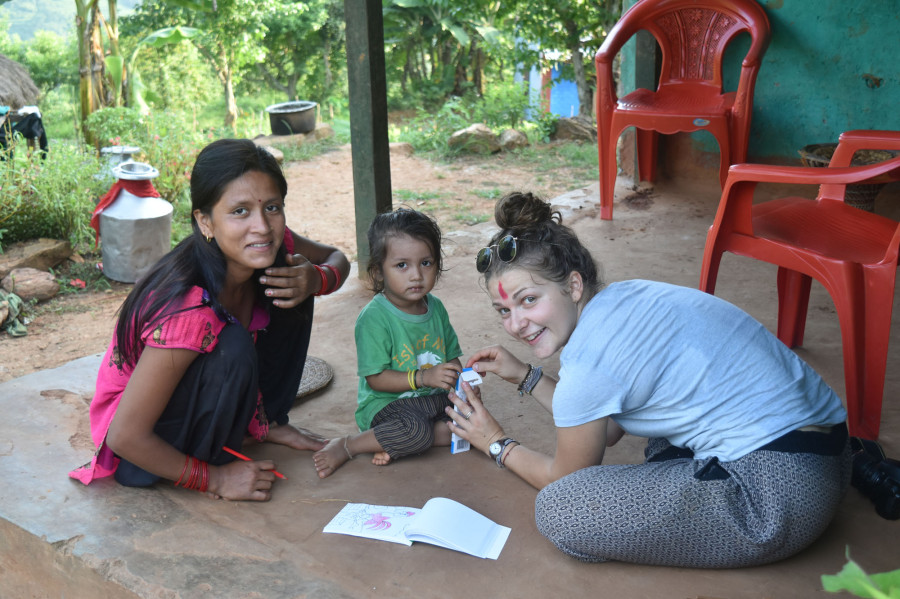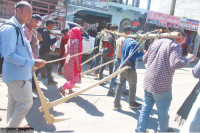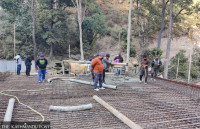National
Dalit homestay blazes a trail in fighting ‘untouchability’
Homestays have become a common sight in rural Nepal—tourists pay to spend a few nights with locals in their homes, eating what they eat, living how they live. But in Vyas Municipality of Tanahu district, there is a homestay with a difference—this institution is run completely by Dalits, a group once considered ‘untouchable’.
Bibhu Luitel & Pratap Rana
Homestays have become a common sight in rural Nepal—tourists pay to spend a few nights with locals in their homes, eating what they eat, living how they live. But in Vyas Municipality of Tanahu district, there is a homestay with a difference—this institution is run completely by Dalits, a group once considered ‘untouchable’.
The Aapshwara Community Dalit Homestay, jointly started two years ago by a community of Dalits, has since housed tourists from 18 countries, including the United States, France, Germany, Japan, Australia, Indonesia, Switzerland and Finland. There has also been a handful of tourists from South Asia, including Nepal and India—mostly open-minded students who don’t believe in caste-based discrimination.
“This has not just helped preserve our culture but it is also helping us live with dignity and self-respect, despite all societal norms,” said Bishnu BK, one of the co-founders of the homestay. The Dalit community has a rich culture and tradition, but has seldom managed to express its identity in public because of societal discrimination and disapproval. “We believe we have created a medium,” she said.
Vyas might be a municipality, but it is still not free of discrimination against Dalits, long considered untouchable according to archaic Hindu beliefs. Dalits are allowed to draw water from public taps and wells, but many locals still won’t eat the food they’ve prepared or touched, says Resham Bahadur BK, who first came up with the idea of a homestay.
It was only in 1963 that the Muluki Ain (Civil Code) defined untouchability as a crime, punishable by a jail sentence of one year and/or a fine of Rs3,000. But this law was feebly enforced and untouchability continued to be practised across the country, primarily in rural areas. It was in 2011 that a new Caste-Based Discrimination and Untouchability (Offence and Punishment) Act comprehensively defined untouchability, criminalised incitement to caste-based discrimination, and mandated compensation for victims. But despite this new law providing for more stringent punishments—three-year imprisonment and/or a Rs25,000 fine—discrimination against Dalits has continued.
The Criminal (Code) Act-2017 also outlaws untouchability in the name of any tradition, practice, religion, culture, caste, community, occupation, physical state or race. Anyone enforcing such discrimination is liable to a maximum three-year jail or Rs30,000 fine or both. A government official convicted of the crime is subject to three months of extra prison.
“Though our law describes untouchability as illegal and unethical, we have not been able to implement it practically in our daily lives,” says Resham.
In and around Vyas, Dalits are primarily known as blacksmiths. Most Dalit homes have a sickle, spade or a variety of tools hanging on their walls, signifying their trade. Tourists visiting the homestay can even indulge in making these tools, in addition to living and eating with Dalits.
“Locals here were hesitant at first,” says Bijay Poudel, director of the Hands-on Institute, which has been training the homestay owners to provide a better quality of service for tourists. “They were unsure this initiative would be accepted because a big part of our society remains conservative.”
The sentiment of a conservative section of society notwithstanding, the local government has supported the homestay and is helping it grow. Vyas Municipality has provided the homestay with comfortable beds for ten of the households involved and has also helped construct 11 properly equipped bathrooms.
Situated 5 kilometres from Damauli, the district headquarters, the Aapshawara Homestay is easily accessible by bus and jeep. The homestay provides a grand view of the sunrise and sunset and the nearby Seti river. The Chhabdi Barahi temple is also a popular tourist destination. Each tourist pays Rs1,000 per night.
In its two years of operation, the homestay has done well for itself, attracting tourists and also providing its operators with a sense of empowerment, says Madhu Maya BK, a homestay owner. The Vyas Dalit community is now in touch with a Dalit community from Chitwan that also plans to open up a similar homestay programme.
“We may not be able to bring about changes across the country overnight. It is going to take time,” says Resham. “But we are extremely positive.”




 9.22°C Kathmandu
9.22°C Kathmandu













